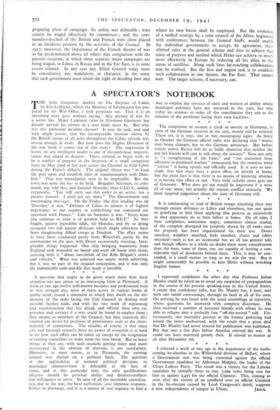A question that ought to be given much more than
local attention has just arisen in an interesting form at Plymouth. A week or two ago twelve well-known business and professional men in that ravaged city, most of them active in various forms of public work, issued a statement in which they dwelt on the im- mensity of the tasks facing the City Council in dealing with possible further raids, and with the vast work of replanning and reconstruction that lies ahead, and offered their own ex- perience and services if a way could be found to employ them ; they meant, as members of the Council, but they expressly dis- claimed any desire for positions of prominence such as the chair- manship of committees. The trouble, of course, is that since city and borough councils have no power of co-option it is hard to see how such offers can be taken up except by the resignation of existing councillors to make room for new blood. But to leave things as they are, with such councils getting staler and more stereotyped in the absence of elections is not satisfactory. Moreover, in most towns, as in Plymouth, the existing council was elected on a political basis. The question of the applicability of national political divisions to municipal administration is debatable at the best of times, and at this particular time the only qualifications effective should be personal ability and disinterestedness and willingness to serve. In spite of all the inevitable centralisa- tion due to the war, the local authorities :lave immense responsi- bilities to discharge, and it is a matter of real urgency to find a way to employ the services of men and women of ability whom municipal polemics have not attracted in the past, but who today are anxious to make all the contribution they can to the solution of the problems facing their own localities.
* * *






















 Previous page
Previous page